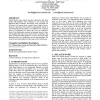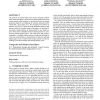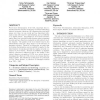115
click to vote
JCDL
2010
ACM
14 years 12 months ago
2010
ACM
Personalization of information retrieval tailors search towards individual users to meet their particular information needs by taking into account information about users and thei...
JCDL
2010
ACM
15 years 2 months ago
2010
ACM
Access to data crucial to research is often slow and difficult. When research problems cross disciplinary boundaries, problems are exacerbated. This paper argues that it is import...
125
click to vote
JCDL
2010
ACM
15 years 2 months ago
2010
ACM
We describe a novel video player that uses Temporal Semantic Compression (TSC) to present a compressed summary of a movie. Compression is based on tempo which is derived from film...
JCDL
2010
ACM
15 years 4 months ago
2010
ACM
We present a new algorithm to measure domain-specific readability. It iteratively computes the readability of domainspecific resources based on the difficulty of domain-specific c...
127
click to vote
JCDL
2010
ACM
15 years 4 months ago
2010
ACM
In search engines, ranking algorithms measure the importance and relevance of documents mainly based on the contents and relationships between documents. User attributes are usual...
104
click to vote
JCDL
2010
ACM
2010
ACM
Timeline interactive multimedia experience (time): on location access to aggregate event information
15 years 4 months ago
Attending a complex scheduled social event, such as a multi-day music festival, requires a significant amount of planning before and during its progression. Advancements in mobile...
123
click to vote
JCDL
2010
ACM
15 years 4 months ago
2010
ACM
Digital libraries must support assistive technologies that allow people with disabilities such as blindness to use, navigate and understand their documents. Increasingly, many doc...
JCDL
2010
ACM
15 years 6 months ago
2010
ACM
The question of citation behavior has always intrigued scientists from various disciplines. While general citation patterns have been widely studied in the literature we develop t...
83
Voted
JCDL
2010
ACM
15 years 7 months ago
2010
ACM
144
click to vote
JCDL
2010
ACM
15 years 7 months ago
2010
ACM
Query expansion of named entities can be employed in order to increase the retrieval effectiveness. A peculiarity of named entities compared to other vocabulary terms is that they...



